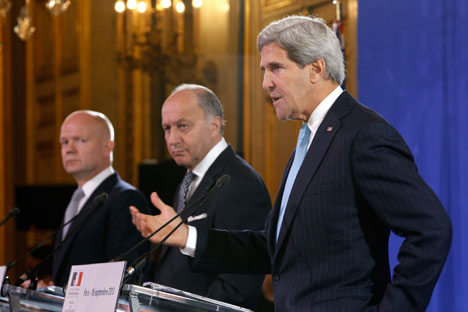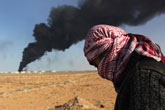Syrian crisis brings Washington and Moscow closer

Foreign Secretary William Hague (L), French Foreign Minister Laurent Fabius and U.S. Secretary of State John Kerry attend a news conference after a meeting on Syria conflict at the Quai d'Orsay ministry in Paris, on Sept. 16. Source: Reuters / Charles Platiau
Last weekend, Russian Foreign Minister Sergei Lavrov and U.S. Secretary of State John Kerry agreed in Geneva that Syria would present to the United Nations full particulars about its stockpiles of chemical weapons, provide international inspectors access to these, and take them out of the country for destruction by mid-2014.
In fact, this process has already begun, since Syria has agreed to the plan and already joined the International Convention on the Prohibition of Chemical Weapons. Accordingly, the U.N. Organization for the Prohibition of Chemical Weapons will now implement the procedures provided for by Lavrov and Kerry.
Russia, the initiator of the Geneva accords, has shown that it can influence the situation not only passively, by using its veto in the U.N. Security Council, but also by means of active peacemaking diplomacy. This is a new quality in President Putin's foreign policy, and not just in the Middle East.
It is obvious that Damascus has been able to avoid a devastating attack on its country, which already finds itself on the edge of a cliff after two and a half years of civil war. “This is a victory for Syria, which has been achieved thanks to our Russian friends,” Ali Haidar, the Syrian minister of state for national reconciliation, told RIA Novosti.
This Geneva agreement allows for the preservation and maintenance of the international peace and security system based on U.N. mechanisms. An American strike against Syria without the consent of the U.N. Security Council could have buried not only the Assad regime, but also the post-war system of international law.
“No one wants the U.N. to repeat the fate of the League of Nations, which collapsed because there was no real leverage over international situations. This is possible, if powerful countries take enforcement actions while bypassing the U.N. and without authorization of the Security Council,” Vladimir Putin said in an article published in the New York Times.
That is why the Geneva accords were supported by Britain, France, Germany and other key international players.
Only the implacable Syrian opposition was against the Geneva accords: For them, a strike against Syria would have been a chance to come to power. Now that chance has decreased dramatically.
At a joint press conference in Geneva, Lavrov said that a conference aimed at a peaceful resolution of the Syrian crisis might be held as early as October. Kerry shared Lavrov’s opinion, pointing out that the solution to this conflict must be a political one.
This part of the Russian-American agreements in Geneva is less actively discussed, but the Geneva-2 peace conference is the key issue in the settlement process, not the chemical weapons.
Obviously, it will be very difficult to implement the elimination of Syrian chemical arsenals and the peace process, as a whole, as the war in Syria is not dying down—and not only the irreconcilable opposition is interested in its continuation. However, the very fact of Russian- American dialogue gives grounds for optimism even above and beyond Syrian issues.
It seems that, after a long chill in the relations between Moscow and Washington, which culminated in the cancellation of President Obama’s official visit to Russia, both countries are again realizing the need for cooperation.
In an interview with ABC television on Sept. 15, Obama pointed out that Russia and the United States need to collaborate. “But, with respect to Mr. Putin, I have said consistently that, where the interests of the United States and Russia converge, we need to work together,” said Obama.
Putin returned the favor. “I welcome the spirit of the American leader to continue this dialogue with Russia on the Syrian issue. We have been calling for joint work for a long time,” he stated in his letter to The New York Times.
According to the Russian president, this issue is very important. “If we can avoid a military action against Syria, we will drastically change the atmosphere in international affairs as a whole; we will strengthen mutual trust. This will be our joint success, which will open prospects for cooperation on other critical issues of our time,” said Putin.
More specifically, Russia and the United States could enhance their cooperation in combating the proliferation of weapons of mass destruction — in particular, in the context of negotiations on the Iranian “nuclear dossier.”
On the other hand, the destruction of Syrian chemical weapons and the talks of the “six intermediaries” of the U.N. with Iran are connected to the idea of creating a Middle East zone that is free of weapons of mass destruction.
All rights reserved by Rossiyskaya Gazeta.
Subscribe
to our newsletter!
Get the week's best stories straight to your inbox

